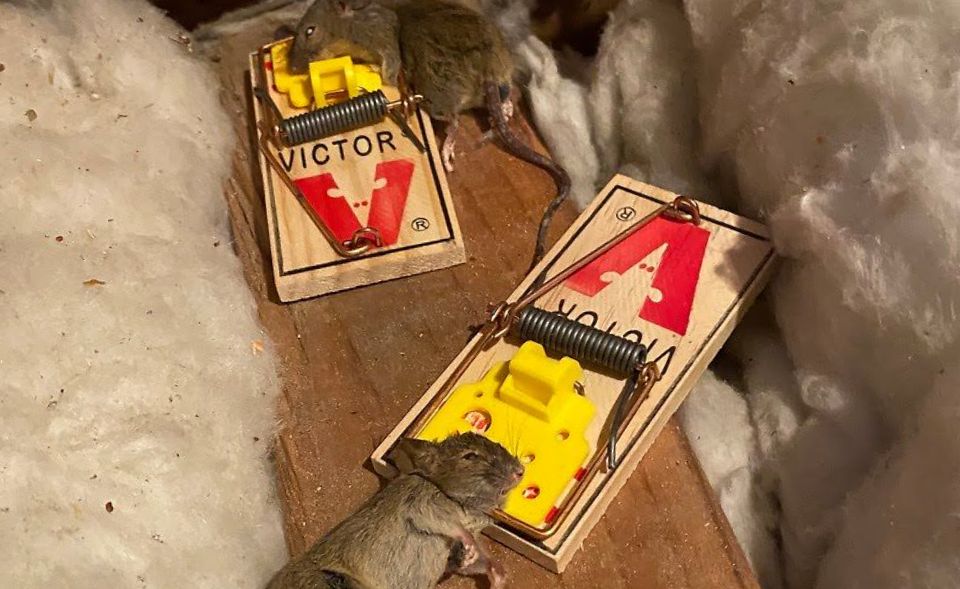
Everybody already knows that rodents, such as mice, spread a wide and pretty frightening list of diseases. What most people don't know, however, is the wide and pretty frightening list of ways in which those diseases are transmitted. It is far easier than you'd think for disease spores — fungi, bacteria, and viruses — to make their way into your body, or the body of your children, or even the body of your pets. And once those diseases are there, some of them are there to stay. A few of them could even be life-altering … or life-ending.
Feces and Urine
Mouse urine can't be seen at all in some cases.
In both cases, the waste material is released as the rodent runs around, so it is inevitable that its paws will come into contact with its own waste at some point. If one of those paws touches a patch of its urine, causing a transmission of bacteria, one paw could then be all it takes to move that bacteria along once more — this time, to the dinner plate that you're about to eat off. Or the pet bowl that your pet will eat its dinner from later. Or even just countertops, shelves, and raw food, such as fruit in a bowl.
It's not a very nice thought, is it? Unfortunately, this transmission of bacteria, viruses and other disease spores is incredibly common.
Nesting Materials In fact, as well as nesting materials, we should add any materials that the rodent(s) come into contact with. There is always going to be a very high risk of bacteria transmission, as mentioned above, but nesting material is particularly dangerous. Feces and urine is likely to be present there, as well as other body fluids, such as birthing fluids. Mice also chew materials like cardboard and paper to soften them up and mould then into a comfortable, warm, and secure nest. The nest has essentially already been in the mouse's mouth.
Again, it's not a nice prospect.
You should NEVER handle anything rodent-related — or anything wild animal, for that matter — with your bare hands. You should also prepare to throw away or dispose of everything that could be contaminated as a result of contact with rodents or rodent-based material. There is a reason that wildlife removal professionals wear full body suits and shoe coverings when they perform a removal job.
Saliva If a rat eats a few crumbs from a piece of bread on the countertop, saliva could cause a transmission of disease. If the mouse licks its paws and then touches something, the bacteria or other disease spores in the saliva on the paws could then be transmitted to other surfaces and items. These are tiny organisms that are too small for the naked eye to see. They're basically invisible. That's what makes them so dangerous, and also what makes cleaning up properly and effectively after a rodent infestation is vital.
Direct Contact If you come into direct contact with a rodent, such as a mouse or a rat, you are coming into direct contact with any surface-based bugs, such as mites, fleas, ticks, etc. You should also bear in mind that rat-born ticks were what caused the destruction of millions of people during the Middle Ages, because of the plague or Black Death. Do not underestimate how dangerous these rodents can be.
When you have direct contact with a mouse, you are also in danger of being bitten or scratched, which once again adds another method of disease transmission.
Direct contact with dead carcasses of mice is just as potentially deadly as direct contact with a live mouse. The disease risks are still present long after the animal itself has died, and you will also have the worry of flies, maggots, and - in turn - other disease risks that they too can bring.
In Conclusion If you have mice in your home, you are putting yourself in the direct line of disease transmission more times in a day than you could possibly imagine. You will never know the exact steps those rodents are taking, and they really could be crawling and scampering anywhere, too — across plates stacked up in the kitchen; across the pots that you left on the stove overnight, with remnants of food still left in there, and perhaps even getting into packages that sit on the shelves in the cupboard, such as cereal boxes.
If you notice signs of a rodent infestation, get the professionals in for a free quote immediately. Professional rodent removal is usually a lot cheaper, a lot quicker, and a lot more effective than 99% of all DIY or homemade remedies you could find recommended on the internet.
Just ask our now-happy customers!
Go back to the mousecontrol.org home page.